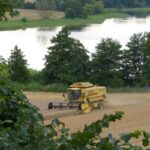Next Big Think: Digitization with sustainability in the agricultural industry

Digitization and artificial intelligence as a necessity for the development towards sustainable agriculture? Future investments in sustainability projects indoor farming and vertical farming. In conversation with Jörg Trübl, member of the board of directors of the Swiss MABEWO AG in Küssnacht am Rigi.
It is not only the Fraunhofer Institute for Experimental Software Engineering (IESE) that is researching future models for agriculture to achieve climate goals and to feed the growing world population. Sensor systems for agricultural production are being tested and optimized at the Fraunhofer Institute. With the help of machine learning algorithms, the growth of a wide variety of plants and their conditions can be compared, creating a knowledge base for building efficient production. Companies such as MABEWO AG and its subsidiaries from Switzerland are also relying on intelligent approaches to food cultivation to meet the growing challenges. Jörg Trübl, environmental engineer and member of the board of directors of MABEWO AG comments: „We are a young but very dynamically growing Swiss technology company with holdings in the DACH region. As a group of companies, we pursue the goal of placing the basic supply of food and energy closer to urban areas while conserving land and resources. Our focus is on developing new solutions for indoor farming with optimization of feasibility, which we demonstrate on our own projects and then sell our equipment and processes to customers around the world. Our customers include producers of food, vegetables, mushrooms, herbs and medicinal plants who value economy as much as ecology.“
Digitization in agriculture: opportunities and risks?
The German Federal Ministry of Food and Agriculture (BMEL) has been funding projects on the use of artificial intelligence in agriculture, the food chain, health nutrition and rural areas since December 2020. The projects focus on machine learning, deep learning, robotics, machine planning and action to the development of pattern recognition, pattern analysis and pattern prediction. What does artificial intelligence mean in agriculture? „Artificial intelligence is a branch of computer science and is primarily concerned with the automation of selected work processes. In this case, computers are specifically programmed to be able to solve complex problems. With the help of this technology, it should be possible to imitate the intelligence of humans and, in the best case, to support humans in solving complex issues. Precision farming and smart farming have already been used in agriculture for 20 years,“ explains Jörg Trübl. But the researchers‘ vision goes one step further. In the future, a machine should be able to behave as intelligently as humans. The areas of application in which AI is expected to take on more and more tasks in the future are very diverse and are not limited to the automotive industry, medicine or the financial sector, but artificial intelligence can make agriculture sustainable and efficient, research institutions agree.

Current technology in crop production: automation, data management, documentation
Agriculture is opening up more and more to AI and process optimization; it continues to advance in digitalization and the use of artificial intelligence. With the help of the latest technologies and digitalization, it is already possible in agriculture to increase productivity by up to 30 percent, and without burdening employees with additional work. Work processes are gaining in sustainability and productivity. „Protecting resources such as land, soil, water and nutrients are global challenges. With the indoor farming solutions of the MABEWO group of companies, we are addressing exactly that. In implementing the energy transition away from fossil fuels, we rely primarily on the use of the only truly abundant energy source: the sun. Our vision is therefore to offer a unique product with the combination of indoor farming systems and plants for the use of renewable energies, which will have a permanent place in the basic supply of regions and urban settlement areas. Our systems follow a modular design, are easily scalable and have a decisive edge, especially in the control software,“ explains Jörg Trübl.
The Federal Ministry of Food and Agriculture has recognized the potential of AI in agriculture and presented the plans for a digital Europe at the beginning of 2020. In doing so, the Federal Ministry of Food and Agriculture emphasized the following, „In the years from 2021 to 2024, 816 million euros will be available to support research projects on the use of artificial intelligence in agriculture, the food chain, health nutrition and rural areas. The new investment program provides targeted support for farms investing in modern technologies with the goals of reducing emissions, preserving biodiversity and increasing resource efficiency. This includes industrial research projects as well as experimental development. Crucial aspects will also be the transfer of research results into practice as well as the dialogue on how to deal with AI and its specific regulation in different fields of application.“
Criticism: the need for AI in agriculture
 The general public is often critical of artificial intelligence and naturally questions the need for such technologies in what has been traditional agriculture. The Institute for Agricultural Climate Protection examined greenhouse gas emissions in Germany in 2019. In this study, it was found that German agriculture was responsible for the emission of about 61.8 million tons of carbon dioxide equivalents. Mainly, this figure arises from methane emissions from livestock and nitrous oxide emissions from the use of agricultural soils. „With regard to the constant change in the climate and the associated global warming, solutions are needed that promote the conversion of conventional agriculture to nature-compatible agriculture. One building block for successful conversion is offered by technologies with digitization, sensor technology and controlled cultivation in closed modules that automatically add nutrients and water and make the use of plant protection products unnecessary. This is also the reason why the Federal Climate Protection Act was passed, which defines the goal of reducing greenhouse gas emissions by at least 55 percent by 2030,“ Jörg Trübl points out. In order to achieve this goal, it is necessary to digitize agriculture and invest in the use of artificial intelligence.
The general public is often critical of artificial intelligence and naturally questions the need for such technologies in what has been traditional agriculture. The Institute for Agricultural Climate Protection examined greenhouse gas emissions in Germany in 2019. In this study, it was found that German agriculture was responsible for the emission of about 61.8 million tons of carbon dioxide equivalents. Mainly, this figure arises from methane emissions from livestock and nitrous oxide emissions from the use of agricultural soils. „With regard to the constant change in the climate and the associated global warming, solutions are needed that promote the conversion of conventional agriculture to nature-compatible agriculture. One building block for successful conversion is offered by technologies with digitization, sensor technology and controlled cultivation in closed modules that automatically add nutrients and water and make the use of plant protection products unnecessary. This is also the reason why the Federal Climate Protection Act was passed, which defines the goal of reducing greenhouse gas emissions by at least 55 percent by 2030,“ Jörg Trübl points out. In order to achieve this goal, it is necessary to digitize agriculture and invest in the use of artificial intelligence.
Projects funded by the German Federal Ministry of Education and Research – digital agriculture in Germany
In the state of Mecklenburg-Vorpommern, ArtIFARM was selected for funding AI in agriculture. After the announcement of this decision, Prof. Dr.-Ing. Mark Vehse (Stralsund University of Applied Sciences), spokesperson of the ArtIFARM alliance, expressed the following: „I am very pleased about the funding of ArtIFARM, because this gives us and the region the opportunity to raise a core competence from Mecklenburg-Vorpommern, namely agriculture – to a high level and become a technological pioneer. In this way, our innovations and strategies can serve as a blueprint for other regions in the future.“ The project involves 30 regional and supra-regional partners, including among others the universities of Stralsund, Neubrandenburg University of Applied Sciences and the University of Greifswald. The goal of this project has been clearly defined – to establish a forward-looking agricultural sector in eastern Mecklenburg-Vorpommern. Prof. Dr. Tobias Hillmann (Neubrandenburg University of Applied Sciences) explains in an interview for the magazine „Industry of things“ which factors make this project so special and innovative. „An important feature of the ArtIFARM alliance is certainly the intensive involvement of regional agribusinesses and agricultural technology companies, but also the involvement of global players in the industry in order to jointly develop innovative solutions with all players in the agricultural sector,“ says Prof. Dr. Tobias Hillmann.
ArtIFARM is pursuing the vision of a virtual machine park, to which farmers have access with the help of a digital pool to machines that are not permanently necessary for the farm. By using AI, it is calculated in advance which machines will be used at which location and to what extent the autonomous systems being developed in the project are suitable for this.

Conclusion: Highly complex systems come together – technical developments increase the demands in agricultural work – excessive demands lead to conflicts – agriculture develops into a highly qualified profession
The more mankind deals with these issues, the clearer the need for these projects becomes. Intensive support is intended to cushion the demands on agriculture and absorb the excessive demands. A general change in thinking is important in order to achieve the defined goals from the Paris Climate Agreement, but at the same time trust and acceptance for the transformation of agriculture must be created. „We also want to contribute a part for the achievement of the defined goals. The indoor farming modules of the MABEWO Group benefit from the connection indoor farm and the generated energy by photovoltaics directly on site. The production in the self-sufficient Green Domes is shifted from the ground up to several production levels, nutrients and water are supplied to the plants in a targeted manner, and the closed cultivation systems allow plants to be grown all year round, independent of the season and without the use of pesticides. The electricity for this is generated on site by means of the Green Dome’s photovoltaic modules – all resources are thus used in a closed cycle,“ Jörg Trübl concludes.
V.i.S.d.P.:
Viktoria Akopjan
Student & Blogger
About the author:
Viktoria Akopjan is studying health economics with a specialization in hospital and pharmacy management at the Apollon University of Health Care Management. Her interests relate to nutritional sciences, public health, and digital development in the healthcare industry. As a working student in the field of human resources development, she is gaining experience for the change to digital transformation.
Contact:
MABEWO AG
Chli Ebnet 3
CH-6403 Küssnacht/Rigi
Switzerland
T +41 41 817 72 00
info@mabewo.com
Represented by Mr. Jörg Trübl
MABEWO AG stands for sustainability. „Make a better world“ invests in the future and creates livelihoods where basic needs are met: MABEWO uses photovoltaic systems for water and electricity production. MABEWO is a reliable local service provider that improves people’s lives and creates jobs. Mr. Jörg Trübl is a trained environmental engineer and has 20 years of practical economic experience in business management as a consultant, coach and CEO of SMEs in Europe. Further information under: https://www.mabewo.com/
PRESSEKONTAKT
MABEWO AG
Catrin Soldo
Chli Ebnet 3
CH-6403 Küssnacht/Rigi
Website: https://www.mabewo.com/
E-Mail : c.soldo@mabewo.com
Telefon: +41 41 817 72 00


